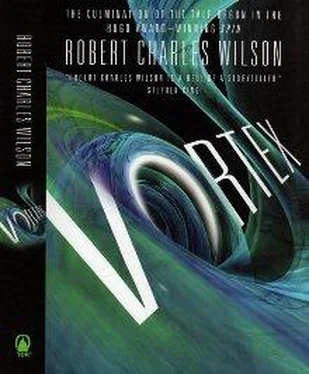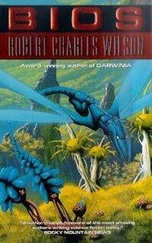I took the matchbook out of my pocket and peeled off the wrapping that had protected it from the rain. The matchbook was dry but my hand was wet and I ruined two matches before I managed to strike one into a steady flame. I wondered if the fumes in the corridor might themselves be flammable, whether I was about to be immolated by my own act of revenge. I decided I didn’t care.
I was in the act of tossing the match when the door to the right opened and the night watchman stepped through.
Maybe there was a surveillance camera in the hallway, though I hadn’t seen one, or maybe I had tripped a warning light in the watchman’s cubby just by coming through the door. Or maybe he had left his post for the purpose of taking a piss. All I knew was that he was suddenly standing in the hallway a couple of yards away, staring at me. He was a skinny guy in jeans and a sweat-stained open-collar shirt. He had a big angular head and his hair was shaved close. He couldn’t have been much older than I was. His eyes bugged out in surprise. A small river of flammable liquid forked around his old brown shoes.
He opened his mouth to say something. But I had already tossed the match. It tumbled through the air, leaving a coiled trail of smoke. I had time to take a single startled step backward. The night watchman just gawked. I don’t think he understood what was about to happen.
The flames were blue and they ran along the surface of the liquid and around the rims of the watchman’s shoes. Then some critical boundary between vapor and air ignited. There was a vast exhalation of hot air, and I was pushed off my feet. I turned and scuttled out the door into the gouting rain. Now the doorway was a curtain of flame and smoke, but through it I could see the watchman burning. He tried to run, and that might have saved his life, but his feet went out from under him. He did a kind of dance before he toppled into the flaming liquid. The dry flooring burned like tinder. He looked like he was screaming, but I couldn’t hear anything over the rush and bite of the flames.
* * *
I thought of Allison making her way to the aircraft docks. Maybe she was there already, waiting. Waiting for me, while the rest of Vox waited for a ticket to heaven.
“You don’t have to carry that weight alone,” Oscar said. He sounded as indulgent and unshockable as the pastor at First Baptist, where my mother used to take me when I was a child. “We’ll share it with you, Mr. Findley. The Coryphaeus will share it with you, once your interface is complete.”
The limbic implant was doing its work. I was sorely tempted to accept his offer of salvation, same as I had been at First Baptist, back when my sins were trivial things. Lay your burden down, young man. Lay it at your savior’s feet. Even as a child, I had understood why so many weeping souls made the journey to the altar. The Coryphaeus knew me, word and deed, inside and out. My sins were its sins.
Oscar watched me closely. “But you’re still not ready to take that last step. Unconditional forgiveness from a polity of your peers… you want it, but you won’t accept it.”
A forgiveness that would last as long as it took the Hypotheticals to show up. Or had I been wrong about that, too? Maybe Vox really would be redeemed, maybe Vox would live forever. There was a presence in my head that insisted it would. I said, “I’m not sure every sin deserves to be forgiven.”
“The man you killed has been dead ten thousand years. Clinging to a single tragic misjudgment is a vain and wasteful act.”
“Not talking about my sin, necessarily.”
“Oh? Whose, then?”
“It was more than murder, Oscar. The death of all those Farmers. It was an act of genocide.”
Whatever Oscar saw in my face, it made him flinch. He glittered with sudden uncertainty. “The Farmers would never have been taken up by the Hypotheticals… their death was always inevitable.”
“They were only here because Vox enslaved them and brought them here.”
“ Necessity brought them here.”
“Someone made the decision.”
“We all made the decision!”
“And you all forgave yourselves for it.”
“The Coryphaeus forgave us. The Coryphaeus is our conscience.”
“I don’t mean to offend you, Oscar, but doesn’t it seem to you that a conscience that can rationalize genocide might be defective?”
He stared at me, radiating violet spikes of anger and resentment. Then he shrugged. “You haven’t lived with your node long enough. Before long you’ll understand.”
That’s what frightens me, I thought.
“None of this matters now,” he said. “Come with me.”
I wanted to. All the years of my adult life I had lived in the harsh light of the burning man. I longed to let the Coryphaeus shoulder my sins. And if the price I paid was oblivion or death, maybe that was nothing but belated justice. At least I would die clean.
Did I deserve to die clean?
“I’d rather be with Allison,” I said. “When the time comes.”
“Then why isn’t she here? I know you feel responsible for her, but she’s an aberration, an empty vessel. Even her affection for you is artificial. You’re Networked now—you must have seen that in her.”
I didn’t want to tell him what I had seen in her.
“Go on, Oscar,” I said. “Go be with your family.”
He started to object, then closed his mouth and nodded in resignation. Maybe he saw how deeply I envied him, and maybe he was too kind to mention it.
He stood up. “All right. Good-bye, Mr. Findley,” he said.
The door closed behind him. I waited until I was sure he had cleared the corridor. I told myself it was time to go. But it would be so much easier to rest, I thought. To let what would happen, happen. It was a foolishness, a terrible vanity, this idea of escape. An insult to the millions who had already lived and died in Vox Core and to the millions more whose bright hopes were burning behind my eyes.
I took a last look around. I thought about Allison, waiting for me. Then I headed for the aircraft docks.
Chapter Twenty-five
Sandra and Bose
Before Bose could say anything else—before Sandra could even begin to consider what he had told her—another bus pulled up at the stop across the street. She turned her head to watch.
Under the orange glare of a streetlight, the shiny-wet bus looked like a floating hallucination. Nobody got on. Two men got off. Just a couple of shift workers carrying dinner pails. The bus pulled away, and the men hurried off wherever they were going—not in the direction of the Findley warehouse.
“It’s getting late,” Sandra said. She wasn’t ready to think about what Bose had admitted about himself, and Bose seemed willing to back away from the subject. “What if he doesn’t show up?”
“I think he will,” Bose said.
“Because of what he wrote?”
“Whatever else they might be, I think Orrin believes his notebooks are prophetic. The passage about Turk Findley setting fire to the warehouse—in Orrin’s mind that’s not something that did happen, it’s something that might happen. He wants to change the outcome.”
“Obviously he knows a few things about the Findley family—if any of it’s true.”
“The basics weren’t hard to confirm. Findley spent a few years in Istanbul. He has an eighteen-year-old son. The high school his son graduated from also has a Latisha Philips registered the same year.”
“Did you talk to her?”
“No. What would I say? She’s not implicated in any of this.”
“Or the son?” Whose nickname, Sandra presumed, was Turk.
“Hard to do that without tipping off Findley.”
Читать дальше












